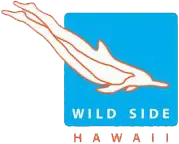Wild Side Specialty Tours: Sustainable Tours with Integrity

We do not seek volume on our tours; we aim only to provide a quality, thought-provoking and potentially life-changing experience. In a global climate of “loving nature to death”. Our Wild Side crew educates guests about the plight of our local marine life, promoting sustainable tourism and stewardship to people from around the world, leaving them with compassion for wildlife and tools to conserve them. Every member of our team makes sure our guests are safe, have lasting memories, and leave with a better understanding of our host culture and precious resources – with a smile on their faces and a sharing of why we love what we do.
Giving Back
Working collaboratively with Cascadia Research Collective and other orgs we submit date gathered onboard to Malama Hawaii with citizen science. photos taken of marine wildlife for abundance and distribution analysis, have led to the Hawaiian False Killer Whales, being granted endangered species status. We have given scholarships or otherwise donated to diverse organizations as Island Pacific Academy, Wild Dolphin Foundation, Hawaii Uncharted, Radiant Girls Hawaii, Hawaii Ecotourism Association, Ma’o Farms and Kanu Hawaii, as well as sponsored school field trips aboard our vessels.
Wild Side’s Green Travel – Best Practices
We owe an Ocean of Gratitude to all who have supported our efforts and strive for sustainability in their own lives. Wild Side Specialty Tours is honored to report our efforts below:
- Mooring safe for reefs and wildlife
- Reduce, Reuse and Recycle We use earth-friendly cleaning products, recycled paper and packaging. We use worm composting to recycle paper and the nutrients from our galley waste.
- Low-sulfur diesel fuel, and EPA compliant engines are combined with best practices – such as GPS guided direct routes.
- Vessels outfitted with low flow toilets
- Removing encountered marine debris when possible, or otherwise reporting it to proper officials.
- Contributing to local non-profits, and employing folks from our own community.
- Office managers work out of their homes rather than drive.
- “Virtual Office” is virtually paperless
- Actively participate in marine issues on both local and national levels.
- Buying locally whenever possible; locally grown, seasonal, or USDA organic food items
- All purchased equipment is as energy efficient as possible, avoid over-packaged goods, and purchase materials in bulk
- Wild Side’s success depends on building productive relationships with one another and third parties based on honesty, integrity, ethical behavior and mutual trust. Every employee should endeavor to deal fairly with each of our customers, and as well as other employees. Any guest or employee wishing to make a report with respect to any of these matters , or to discuss a sensitive issue or question, may call us, make a report by e-mail (contact info below)
In-Water Best Practices
Avoiding influencing the natural behavior of any marine life, encourages our guests to do the same. By providing as natural a viewing experience as possible when interacting with the marine environment, everyone will:
- Be aware of our body and equipment so as to avoid contact with the reef or other marine life.
- Not approach any marine life within arm’s reach for any reason.
- Not approach turtles within 10 feet and will avoid impeding a turtle’s path to the surface for breathing.
- Protect ourselves and marine life and their habitat by not feeding them to; make animals less aggressive, protect marine life from ingesting harmful foods, protect the balance of the marine ecosystem, and let the fish do their job.
- Apply reef safe sunscreen 20 minutes before entering the water.
- Use biodegradable defog.
Increasing the sustainability of natural systems is not just good business, it’s the right thing to do.
